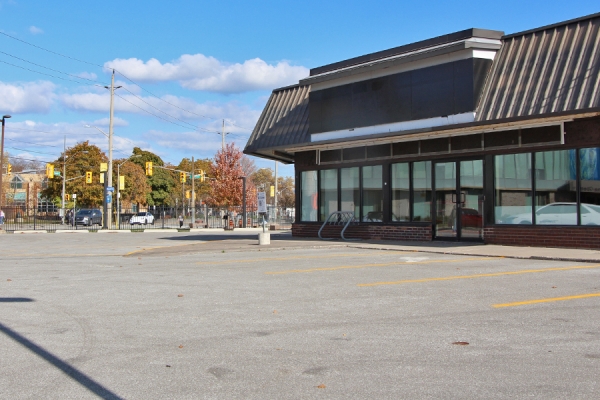 Researchers Ethan Douglas, Nick Vukotic, Anton Dmitrienko, and Joy-Lynn Kobti have developed
Researchers Ethan Douglas, Nick Vukotic, Anton Dmitrienko, and Joy-Lynn Kobti have developed
Utilizing robotics and ingenuity, UWindsor researchers have developed a one-of-a-kind instrument and a series of cutting-edge patent pending devices that could aid the pharmaceutical industry by enabling the formulation and production of more efficient drugs.
The Vukotic Research Group, led by professor Nick Vukotic from the Department of Chemistry and Biochemistry in collaboration with industry partner PROTO Manufacturing Ltd., spearheaded the development of both the innovative instrument and the newly patented devices.
This partnership also led to the creation of a new company called Solid4m. The company’s name is a play on the term “solid form,” reflecting its focus on devices which aid in discovering and forming new solid materials, while its logo draws inspiration from UWindsor’s blue and gold.
“I’ve been sketching designs for these devices for almost three years, trying to figure out how to bring this vision to life, because nothing on the market comes close,” says Dr. Vukotic.
“With these new devices, we can screen for new materials faster than most labs worldwide, giving us a competitive edge — we’re able to do things no one else can.”
The project began with a longstanding challenge that Vukotic sought to overcome.
“When creating new materials, you need to experiment with countless conditions — it’s like perfecting a recipe,” he explains. “But you don’t know all the right variables and testing them in the lab is time-consuming. It always frustrated me that we couldn’t test everything at once.”
Previously, Vukotic’s lab developed an X-ray diffraction instrument that allowed for rapid sample screening, drastically increasing the speed of data collection from a very small amount of material. This led to a significant improvement in throughput, from 20 samples a day to 400. However, this rapid screening capability created a new challenge: the need to generate hundreds of new samples daily for testing.
“The real crux of the problem was figuring out how to test hundreds of reaction conditions, create the samples quickly, and then analyze them,” Vukotic recalls.
After discovering that no existing device could meet this need, the team began designing and testing prototypes. The result was the creation of the Modular Multiwell Devices (MMDs), metal plates with interchangeable interior layers that serve specific functions and allow for 24, 48, or 96 reactions to be carried out simultaneously. This innovation significantly accelerates the discovery of new materials.
The flexible nature of the MMDs enables testing under various conditions, including the use of liquids, heat, and mechanochemistry, a process that involves grinding solids together to create new materials.
The new devices allowed the team to screen thousands of new reactions, which Vukotic said his students loved because suddenly all their chemistry went significantly faster.
The potential applications of these devices span industries, from health care and nutraceuticals to materials science and agrochemicals. However, Vukotic believes the pharmaceutical industry stands to gain the most from the increased efficiency these tools provide.
“We can explore vast areas of chemical reaction space that were previously inaccessible, uncovering formulations that others might have missed,” he explains. “Essentially, we can improve existing pharmaceuticals and reduce the time it takes companies to develop ideal formulations.”
A grant from the Canada Foundation for Innovation John R. Evans Leaders Fund matched by the Ontario Research Fund – Research Infrastructure program further enhanced the lab’s capabilities, enabling the purchase of a programmable robot designed to dispense solid powder samples.
“Manually loading small amounts of 100 samples is very time consuming,” Vukotic notes. “The robot, with its dispensing arm, automates the process. We’re moving toward a semi-automated discovery lab, integrating robotics to allow materials chemistry to continue even when no one is physically in the lab.”
Vukotic emphasizes the importance of industry partnerships, like the one with PROTO, in pushing the boundaries of research and making it globally competitive.
“Collaborating with companies helps drive technology forward by leveraging the strengths of Windsor-Essex industries. This accelerates product development and brings innovations to market faster.”
The Vukotic team members responsible for the invention of this work includes PhD graduate students Ethan Douglas and Joy-Lynn Kobti, along with research associate Anton Dmitrienko. However, new group members like undergraduate researcher Ayesha Sayyeda are joining what they affectionately call the “high-throughput team” within the Vukotic group each semester and are bringing fresh ideas and advancing new capabilities.








